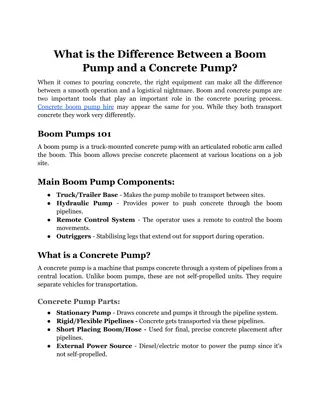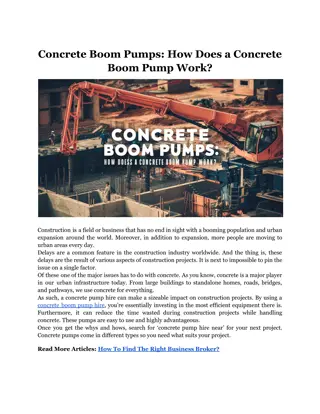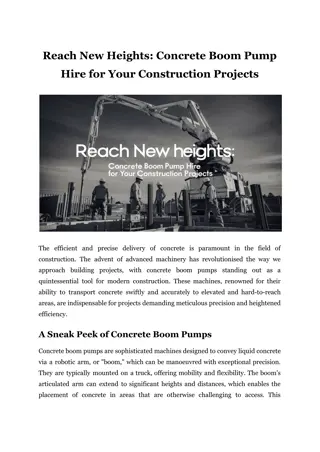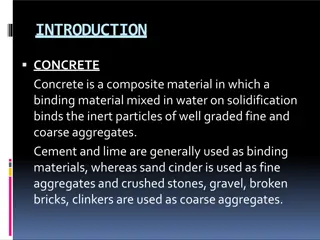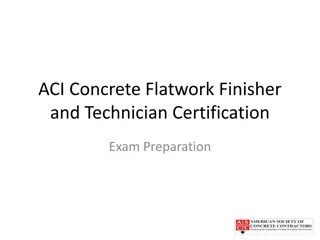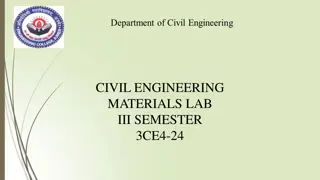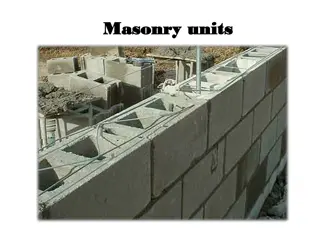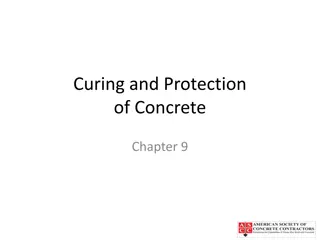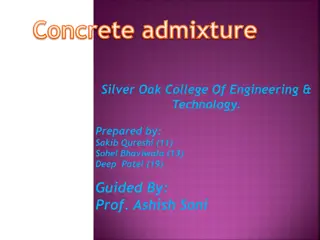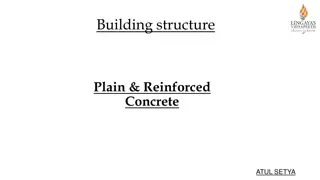
Top 5 Applications for C20 Concrete in Construction
Discover the top 5 practical applications of C20 concrete in modern construction projects. Find out why builders prefer it.
Download Presentation

Please find below an Image/Link to download the presentation.
The content on the website is provided AS IS for your information and personal use only. It may not be sold, licensed, or shared on other websites without obtaining consent from the author. Download presentation by click this link. If you encounter any issues during the download, it is possible that the publisher has removed the file from their server.
E N D
Presentation Transcript
Top 5 Applications for C20 Concrete in Construction Concrete is one of the most versatile and widely used materials in construction. Among the various grades of concrete, C20 concrete is a popular choice for its balance of strength and workability. With a compressive strength of 20 Newtons per square millimeter (N/mm ) after 28 days of curing, C20 is suitable for a wide range of applications. This grade is often used in projects that require a reliable, durable material that can withstand moderate loads and environmental stressors. This concrete grade is composed of cement, sand, and aggregates (such as gravel or crushed stone) mixed with water. The typical mix ratio for C20 concrete is 1:2:4 (cement:sand), which ensures the appropriate balance of components to achieve the desired strength and workability. It is easy to work with, making it a favorite among builders and contractors for its ease of handling and placement. Top 5 Applications for C20 Concrete in Construction 1. Residential Foundations
One of the most common uses of C20 concrete is in the construction of residential foundations. Foundations are crucial for any building, as they provide stability and support for the entire structure. It offers the right balance of resilience and performance, which makes it ideal for use in strip foundations, trench-fill foundations, and raft foundations. Benefits: Strength: With a compressive strength of 20 N/mm , C20 provides ample support for residential buildings. Durability: Properly cured C20 concrete is resistant to weathering, ensuring long-lasting foundations. Cost-Effective: It is relatively affordable, making it a cost-effective choice for residential projects. Application: To create a residential foundation using C20 concrete, the ground is first excavated to the required depth. A formwork is then set up to contain the concrete. The C20 mix, typically in a 1:2:4 ratio of cement, sand, and aggregate, is poured into the formwork and allowed to cure. This results in a strong and stable foundation that can support the weight of the building. Read More Articles: Staying Connected: Reliable Fiber Optic Installers for Atlanta's Growing Needs 2. Paving and Driveways It is also widely used for paving and driveway construction. Its moderate strength makes it suitable for areas that need to withstand the weight of vehicles but do not require the higher strength of industrial-grade concrete. Benefits: Versatility: It can be used for various types of paving, including driveways, walkways, and patios. Aesthetic Appeal: Concrete driveways can be finished in different textures and colors to enhance the appearance of a property.
Low Maintenance: Concrete driveways are durable and require minimal maintenance compared to other materials like asphalt or gravel. Application: For paving and driveways, the ground is prepared by leveling and compacting the soil. A sub-base layer of compacted gravel is often added to improve drainage and stability. The C20 concrete mix is then poured and spread evenly using screeding tools. It is essential to create control joints to prevent cracking. The surface can be finished with a broom, trowel, or stamp to achieve the desired texture. 3. Floor Slabs C20 is commonly used for floor slabs in residential and commercial buildings. Floor slabs give a flat, stable surface for various types of flooring materials and are essential for the structural integrity of a building. Benefits: Strength: It provides sufficient strength to support typical loads in residential and light commercial buildings. Thermal Mass: Concrete floor slabs help regulate indoor temperatures by absorbing and slowly releasing heat. Versatility: It can be used for ground floors, basement floors, and suspended slabs. Application: To construct a floor slab, the ground is prepared by leveling and compacting the soil. A vapor barrier may be installed to prevent moisture from seeping through the slab. The concrete is poured into the formwork and spread evenly. Reinforcement, such as steel mesh or rebar, is often added to enhance the slab's strength and prevent cracking. The surface is smoothed using a trowel or power float and allowed to cure properly. 4. Footpaths and Walkways
It is an excellent choice for constructing footpaths and walkways due to its durability and ease of installation. These structures need to withstand foot traffic and occasional loads from bicycles or light vehicles. Benefits: Durability: It can endure varying weather conditions and heavy foot traffic without significant wear and tear. Customisable: Concrete footpaths and walkways can be designed in various shapes and finishes to complement the surrounding landscape. Safety: Concrete surfaces provide good traction, reducing the risk of slips and falls. Application: The ground for the footpath or walkway is excavated and leveled. A compacted gravel sub-base is often laid to improve drainage and stability. The C20 concrete mix is then poured into the formwork, spread evenly, and finished with a trowel or broom to create a non-slip surface. Additionally, control joints are added to prevent cracking, and the concrete is allowed to cure properly. Read More Articles: What is HID Prox Key? How Similar/Different it is from Prox Cards? 5. Retaining Walls Retaining walls is essential in landscaping and construction to hold back soil and prevent erosion. C20 concrete is suitable for constructing small to medium-sized retaining walls due to its strength and workability. Benefits: Strength: C20 provides sufficient strength to support the lateral pressure of soil. Durability: Concrete retaining walls are resistant to weathering and can last for many years with minimal maintenance.
Aesthetic Options: Retaining walls can be finished with various textures and colors to enhance the landscape design. Application: To build a retaining wall, the ground is excavated to the required depth, and a footing is constructed using C20 concrete. The wall formwork is set up, and reinforcement is added if needed. The mix is poured into the formwork and allowed to cure. Once the formwork is removed, the wall can be finished with a variety of surface treatments to achieve the desired appearance. The Bottom Line C20 concrete is a versatile and widely used material in construction, suitable for various applications due to its balanced properties of strength and workability. From residential foundations and driveways to floor slabs, footpaths, and retaining walls, it provides a reliable solution for many construction needs. By understanding the proper application techniques for C20, builders and homeowners can guarantee the success of their projects. With our years of experience and expertise, our specialists at Pro-Mix Concrete can make an adaptable C20 concrete mix ratio for your project. So, get in touch with us and obtain our comprehensive support and guidance along with the highest-quality concrete! Site Article: Top 5 Applications for C20 Concrete in Construction




